QuestionMy cat had her 2nd litter of kittens today. Its her 2nd as far as I know. She had 4 babies and she cleaned them just fine after birth and layed with them for a few hours but she never really fed them. Not long after they were all delivered she left the box and hasnt really returned to them. If she does its for just a few minutes. The kittens never have a chance to get a nipple she doesnt lay close enough and she hasnt tried to move them either. I wasnt aware that your not suppose to touch them so I petted each one a little bit. I am worried I caused her to abandon the litter because of my smell. I was told to fix that you can rub some vanilla extract on your hands and then touch the kittens and rub the mommies nose so they will "all have the same scent again" I did so and right away she jumped in the box and sniffed them but then she continued ignoring them. When i just went to try and get her to go into the box, she wouldnt. She did this low soft kinda growl and wouldnt even go in the closet where the kittens are. I know they are hungry they have been looking for a nipple on eachother, where I live its too late to go to the store and get them fake mothers milk. I am really concerned for the kittens well being. I would hate to have any of them die because of my stupidity. Please help me, is it normal? is it ok that they dont eat right away? THANK YOU FOR YOUR HELP!!!!!
AnswerKristy,
I'd like to start off by letting you know that although many websites tell you not to touch newborn kittens at all it's necessary to do so for short periods from birth onward (increasing the amount of pets and cuddles as the kittens get older and become more independent from mom) in order to socialize them. Unless there was lots of noise and activity around mom's nest box while she was in labor and delivering her kittens that you created in all likelihood the little pets you've given didn't cause mom to reject her babies, she probably would have done so regardless of whether you touched them at all or not.
At this point I'd say that it's a safe bet to say that mom has rejected her babies completely which is a tough issue since they won't be getting any of the colostrum that they should have which would have provided them with the antibodies they needed to reduce their risk of contracting viral/bacterial infections. I suspect that the reason mom has rejected her babies has to do with the timing of the litter provided of course that she doesn't have a history of rejecting her babies (some queens will kill kittens born before the weather begins to warm up and the days start getting longer). Don't push it with trying to get mom to be a good mom and provide care for the kittens or she may kill and eat her newborns (completely a natural behaviour in the cat world although distasteful from the human perspective), since she's rejected the babies keep them away from her when you can't supervise - her growling is a clear sign that she's not interested in motherhood at this point. Mom should probably see a vet tomorrow if at all possible just in case she's got any kittens who didn't make it out into the world for one reason or another just to be on the safe side (just like people cats can have complicated births).
Your main priority at this point in time is to keep these babies warm, dry and comfortable and provide them with some nourishment. If you have a 24 hour vet in your area you may want to call and ask if they have any kitten formula and bottles/syringes (depending on what you prefer to feed with) - it's a little early in the year, but they may have some in stock and commercially prepared kitten milk replacer is second best to mom's milk. If you don't have a 24 hour vet in your area you can give these babies full fat goat's milk (warmed to a comfortable temperature on the inside of your wrist just like you would for a baby) tonight. If you aren't able to get goat's milk anywhere at this time of night I'd recommend the following recipe:
Emergency kitten formula
90 ml of condensed milk
90 ml of water
120 ml of plain yogurt (not low fat)
3 large or 4 small egg yolks
Most newborn kittens weigh between 80-140 grams at birth with the average healthy kitten weighing in at between 100-120 grams. When you feed these babies be sure that you don't allow them to roll onto their backs like human babies, this can cause them to aspirate (inhale) their formula and essentially they drown. You don't need to put the babies on a heating pad if your home is comfortable and free of drafts, if your house is on the cool side (or even air conditioned depending on where you live) then I'd recommend using a heating pad on the lowest setting wrapped in a few layers of thick towels and be sure that the heating pad itself doesn't cover the entire box that the kittens are in, they need to be able to crawl away from the heat easily if they're too hot. On average while many people say that newborn kittens can be fed every 3-4 hours I generally find that feeding them to a point where their bellies are gently rounded every 1 1/2-2 1/2 hours. Be sure to burp the babies by gently sitting them upright (like you're sitting a small child on your lap) and you can either gently tap their backs until they burp or gently rub their tummies using an upward motion. Once the babies have burped you will need to gently stimulate them to urinate/defecate by rubbing their bottoms from genitals to bum repeatedly (they may not pass any stool tonight and that's okay, but they should pee fairly readily when stimulated) with a cotton ball, sections of an old face cloth cut into strips or unscented natural baby wipe, this will have to be done after every feeding. Initially it's a very good idea to check on newborn kittens that haven't had an opportunity to nurse from mom every 2 hours or so even if they don't cry for you because you want to ensure that they're getting enough to eat, they're not too hot/cold and that they continue to be strong and vigorous. If you notice that one or more kittens starts to fade there many not be much you can do about it because by the time you start seeing signs of serious weakness, poor feeding, etc the kitten is already in all likelihood beyond help. Since these babies are brand new you may also want to gently clean their umbilical stumps with a Q-tip and a tiny amount of rubbing alcohol or iodine a couple of times a day until the stumps have completely dried up. If you find that the kittens develop loose or watery stool add some plain yogurt to their formula (whether it's homemade or commercially produced kitten formula) because yogurt contains the beneficial bacteria normally found in the healthy digestive tracts of mammals which means that it will help to settle down diarrea fairly quickly.
Although hand raising newborn kittens is tiring and labor intensive it's well worth it, however it requires loads of patience, a fair amount of time and some sleepless nights (sometimes by the time that you finish feeding all of the kittens, burping and cleaning them up you'll have enough time to sterilize kitten bottles/nipples, make up more formula and start again). I would recommend that you buy the orphan kitten/puppy feeding kit made by Just Born since the bottles, nipples and bottle brush can be sterilized in boiling water which will cut down on the risk of infection - just don't forget to pierce the nipples with a few little holes made by a hot pin, otherwise you could have some very cranky kittens on your hands! If you're able to find a nursing mom who might be willing to adopt these babies as well as caring for her own litter (you'd still have to do supplemental feeds, but it would be much easier on you and better for the kittens in the long run) that really would be best for them since mom's milk means these kittens will be stronger and healthier, but if you can't find a lactating queen willing to adopt then hand rearing these little ones is the next best thing. Please don't hesitate to contact me again - I'll be more than happy to talk you through any questions or concerns you might have during the next few weeks.

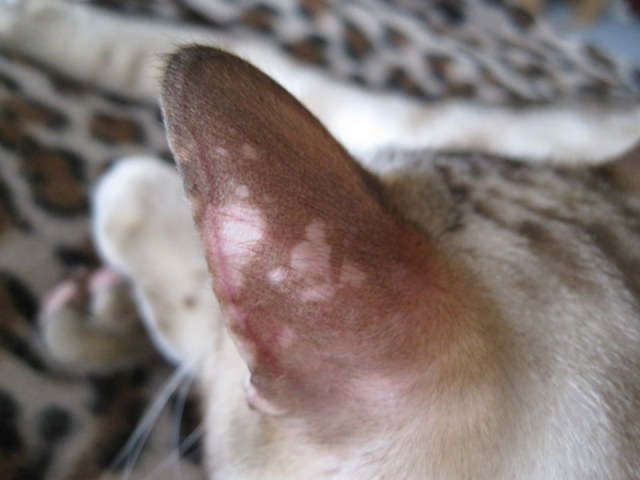 Vitiligo in Pointed Bengal
Question
Possible Vitiligo on B
I have a 1 and a 1/2 ye
Vitiligo in Pointed Bengal
Question
Possible Vitiligo on B
I have a 1 and a 1/2 ye
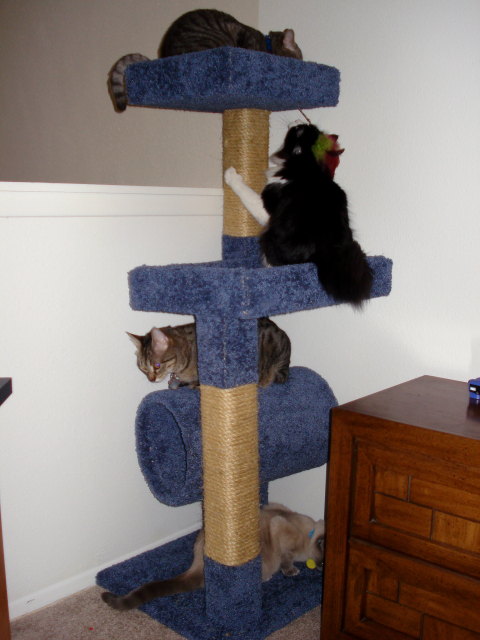 Cat and Dog Introductions
QuestionHi!
I recently acquired a tortie; although I wa
Cat and Dog Introductions
QuestionHi!
I recently acquired a tortie; although I wa
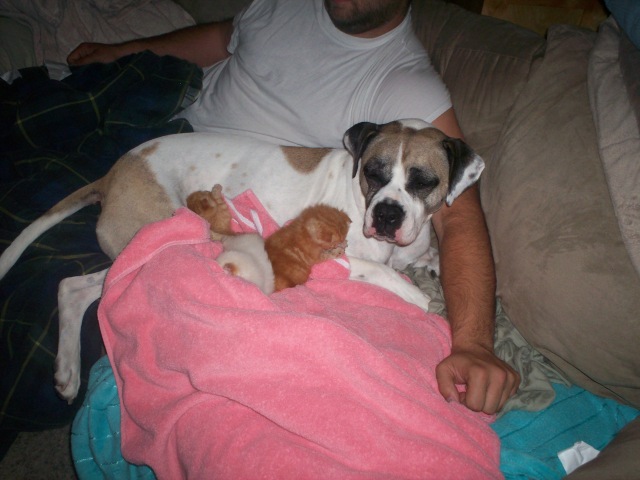 how long do I need to bottle feed?
Question
3 weeks old with their
4 weeks ago I was ridin
how long do I need to bottle feed?
Question
3 weeks old with their
4 weeks ago I was ridin
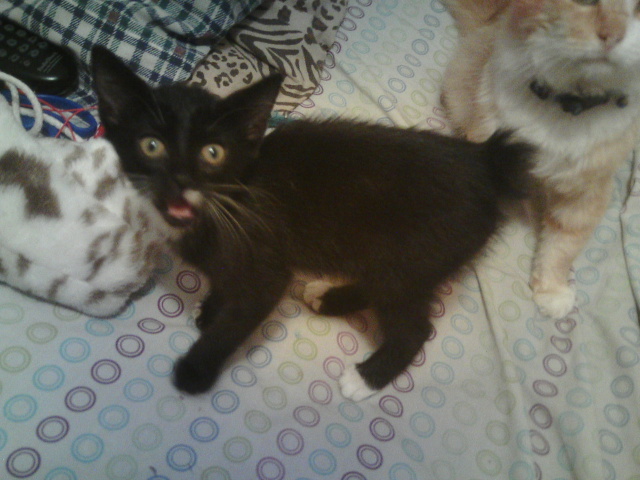 what breed is my bobtail kitten?
Question
Midnight
About a month ago I got a little bobt
what breed is my bobtail kitten?
Question
Midnight
About a month ago I got a little bobt
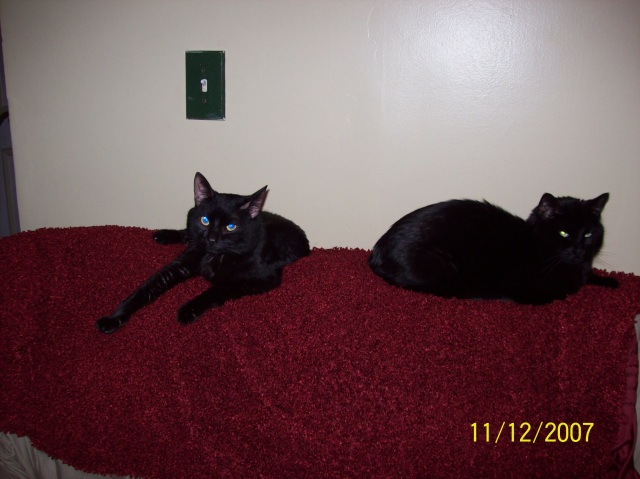 Cats continuing to pee on bed(s)
Question
Our cats...Payten and
I have read the
Cats continuing to pee on bed(s)
Question
Our cats...Payten and
I have read the